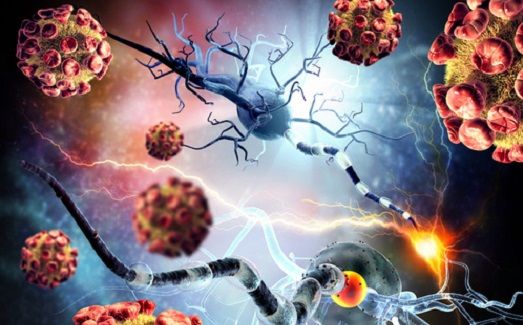Stem Cell Therapy May Halt Multiple Sclerosis
Stem cell therapy gets dramatic results in MS study.

New data from a five-year study suggest a combination of stem cell transplantation and immunosuppressive therapy can stop the progression of relapsing-remitting multiple sclerosis in most patients.
Researchers from the Immune Tolerance Network have been following a cohort of relapsing-remitting multiple sclerosis (RRMS) patients in an effort to see whether high-dose immunosuppressive therapy (HDIT), coupled with autologous hematopoietic cell transplantation (HCT), could slow down the disease. Though the study was small, with just 24 participants, the results were dramatic. Nearly 7 in 10 participants (69%) had no progression of disability during the five years after transplantation, a significantly higher success rate those of the MS drugs already on the market. Moreover, the results appear to be based solely on the therapy, since none of the patients in the trial received MS medication after their transplants.
The five-year results echo the three-year results of the study, which were published back in 2014.
“These extended findings suggest that one-time treatment with HDIT/HCT may be substantially more effective than long-term treatment with the best available medications for people with a certain type of MS,” said Anthony S. Fauci, MD, the director of the National Institute of Allergy and Infectious Diseases (NIAID), in a press release.
The NIAID, which is part of the National Institutes of Health, sponsored the study, dubbed HALT-MS.
The study’s primary endpoint was “event-free survival” (EFS), which the researchers defined as “survival without death or disease activity from any one of: disability progression, relapse, or new lesions on MRI.”
When researchers broke down the results by specific disease activity, they found 91.3% of participants had no disease progression; 86.9% had no clinical relapses; and 86.3% survived without any activity detected on MRI.
Patient scores on the Extended Disability Status Scale (EDSS) decreased by an average of 0.5 points during the five years, a sign that the treatment lessened the overall disability level in patients.
The two dozen volunteers in the study ranged in age from 26 to 52, and each had suffered from disease progression despite treatment with already approved drugs. Not only did the HDIT/HCT therapy work where the existing therapies failed, but some patients actually reported improvement, in the form of recovered mobility.
The new study aligns with a study published in 2015 that also looked at the effects of autologous stem cell transplantation in RRMS. That study, conducted at Northwestern University, included 123 RRMS patients and 28 patients with secondary progressive MS. After four years, 80% of patients were relapse-free and the participants saw their EDSS scores drop by 1.0 points, on average.
Adverse effects in the new Immune Tolerance Network were minimal, mostly related to reduced blood cells and infections. However, none of the patients in the study reported significant neurological side effects. Three patients died during the course of the study, but the deaths were unrelated to the therapy.
Daniel Rotrosen, MD, director of NIAID’s Division of Allergy, Immunology, and Transplantation, said the results warrant a larger-scale study.
“If these findings are confirmed in larger studies, HDIT/HCT may become a potential therapeutic option for patients with active relapsing-remitting MS, particularly those who do not respond to existing therapies,” said Rotrosen, in the NIH press release.
The study, titled “High-dose immunosuppressive therapy and autologous HCT for relapsing-remitting MS,” was published Feb. 1 in Neurology.
Related Coverage:
MS Patients Improve with Stem Cell Transplants
Mixed Signals in Ongoing Search for a Multiple Sclerosis Diet
Diet and Gut Microbiome Influences Multiple Sclerosis Disease Activity